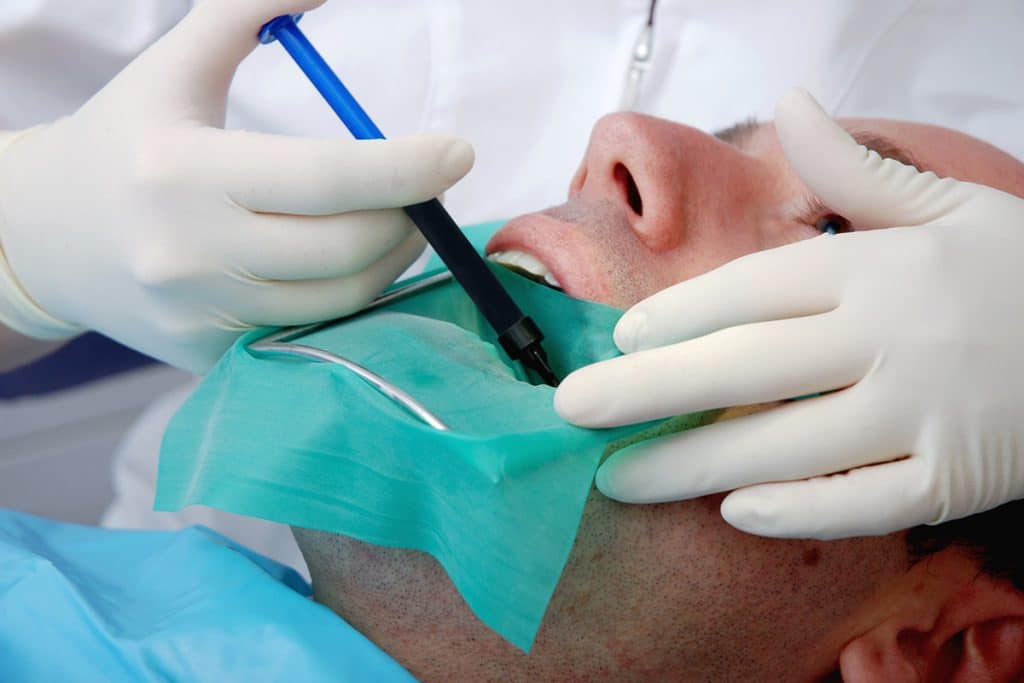Can A Root Canal Be Done On A Cracked Tooth?

A cracked tooth is an urgent situation requiring prompt treatment. In many cases a cracked tooth can be saved as long as you don’t wait to seek treatment.
How is a cracked tooth treated? Who should you see about a cracked tooth? Here’s what you need to know for the best chance of saving your tooth.
Types of Cracked Teeth
The following types of cracks may occur in teeth:
- Craze lines are thin, shallow cracks that form in teeth. These do not typically require treatment as they are only superficial.
- Cracked crown. When a crack forms in the crown of your tooth, the visible portion above the gums, it can most likely be saved.
- Fractured cusp. When a piece of a tooth breaks off it is considered a fractured cusp. In most cases the tooth can be saved.
- Vertical root fracture. If the crack originates in the root of the tooth under the gums it is called a vertical root fracture. This tooth can rarely be saved.
- Split tooth. A severe crack that splits the tooth in half is not treatable. It will need to be extracted.
Treatment for a Cracked Tooth
A cracked tooth that is capable of being saved will undergo the following treatments:
- Root Canal Therapy. A cracked tooth will need root canal therapy. This means removing the dental pulp, the soft tissue at the center of the tooth, and filling it with a replacement material. This fortifies the tooth and prevents infection.
- Dental Crown. After the tooth is treated with a root canal, a dental crown will be placed over the tooth to restore the health, function, and appearance. A crown is a tooth-shaped cover that can be made of porcelain or metal. It can be designed to match your natural teeth.
Why Does a Cracked Tooth Need a Root Canal?
A cracked tooth is highly susceptible to infection. Bacteria can enter the tooth through a crack and reach the root canal. The root canal contains dental pulp, soft tissue surrounding blood vessels and nerves that sustain the tooth. If bacteria reaches the dental pulp it can cause an infection that threatens the health of the tooth.
A root canal can treat an existing infection in a cracked tooth, or prevent an infection from occurring in the first place. The best case scenario is for a root canal to be done proactively before the tooth can develop an infection. This is why prompt treatment for a cracked tooth is so important. It increases the chances that your tooth can be saved, and it prevents a painful toothache.
Frequently Asked Questions About Cracked Teeth and Root Canals
How do you know if you have a cracked tooth?
Sometimes a crack in a tooth is difficult to see. Common symptoms of a cracked tooth include:
- Toothache
- Pain when chewing
- Pain that comes and goes
- Swollen gums
- Discoloration
Does a root canal hurt?
Local anesthesia is used during a root canal to make sure you are comfortable. The nerves in the area being treated will be numb so you won’t feel any pain. If you are feeling anxious, sedation is available to help you relax.
Where To Go For Cracked Tooth Treatment
If you have a cracked tooth or think you might, an endodontist is the right dental specialist to see for treatment. Elite Endodontics of NH can assess your tooth to determine the severity of the crack and provide the best treatment option for saving your tooth.
Contact us today to learn more and schedule an appointment.
